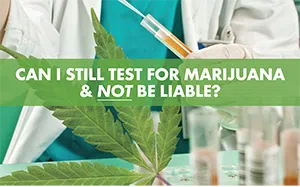Rules for drug testing employees can be confusing, but it’s neither as complicated nor as impossible as you may think.
Are you confused about whether or not you should (or can) continue testing for employee marijuana use? If so, you are not alone. But take heart. It’s neither as complicated nor as impossible as you may think.
As state and local entities change the rules pertaining to how and when an employer may test for THC, the evolving landscape can feel overwhelming. It’s not simply the shifting laws that have an impact, it is also rulings in court cases that have an impact on how employers may approach this issue.
For those who do business across state lines or in multiple states, keeping up with these changes can be challenging. However, it is imperative that employers have some fundamental components in place to ensure they are operating both safely and in accordance with state laws.
First and foremost, there is simply not enough stress that can be placed on the necessity of having a solid, comprehensive and up-to-date drug and alcohol policy in place.
Refresh Your Policy
The workplace drug and alcohol policy is the foundational cornerstone of when and how employers may conduct their drug testing program. It is critical, particularly in regions where laws are changing, that employers review and refresh their policies, ensuring that all practices are both current and include a commonsense approach.
In states where restrictions have been put into place for marijuana testing, review of the policy by an attorney who has expertise in drug and alcohol testing is advised. This step in the process is key. Often, attorneys who work on employment practices will advise that it is best to simply stop testing for marijuana. This is fear-based advice that simply comes from a lack of experience in drug testing law as well as decades of precedent that supports employer’s rights as well as the validity and efficacy of the drug test.
According to the Drug Screening Compliance Institute, testing for marijuana is still legal in all fifty states of the U.S. Yes, there are restrictions that apply for some, but simply throwing out the practice of drug testing leaves employers at more risk of liability from costly accidents, injuries and fatalities caused by those working under-the-influence of impairing substances.
Reduce Your Liability
There are steps employers should take to reduce the chances of inviting a situation in which they could be found liable for discrimination against employees where marijuana use is concerned. These are simple rules that everyone can easily follow.
First of all, do not discriminate against an employee merely because you have discovered they hold a state-approved card that allows them to purchase cannabis in a dispensary where marijuana for ostensible medical use is legal. What does this mean? It means you cannot fire or take action against someone simply because they have the “medical marijuana card.” That knowledge alone does not constitute action on your part as this alone does not constitute evidence of a policy violation. Period.
Secondly, understand that it is absolutely necessary for every supervisor to be trained on how to recognize the signs and symptoms of employee substance use. Why? Because the observation of concerning behaviors that may indicate an individual could be operating under-the-influence of an impairing substance has become equally as important as the drug test itself.
Documentation of these signs and symptoms is paramount because ultimately, it is not primarily the result of the drug or alcohol test that matters when it comes to safety, it is the behaviors putting safety in jeopardy that are the chief concern and for which an employer can take action based on performance.
Thirdly, whatever is stated in the updated and state-law-compliant workplace drug policy should then be carried out with consistency and uniformity every time there is a policy violation.
In other words: FOLLOW the policy! Not doing so can lead to incidental discrimination if/when one employee or situation is treated differently than the last. If mitigating circumstances occur that cause any deviation, thoroughly document and state a clear reason for the response. Exceptions to your policy should be the extremely rare occasion and by no means a norm. Deviating from what has been established in your policy is a risky move that can place you square in the path of liability.
Always ensure that your entire workforce is made aware of your policies and that you have documented evidence they have been informed so no one can claim ignorance of the rules.
This lends to an important piece of the puzzle that can often be missed. Drug and alcohol testing programs should never be put into place punitively. Your policy is not meant to serve the purpose of catching people who violate it. The core purpose is to support your safety program. Creating a strong safety culture means setting an expectation that operating under-the-influence of an impairing substance is not tolerated.
Because a state or local entity has chosen to decriminalize and/or commercialize a substance does not mean that employees should expect to work buzzed, stoned, or in any unsafe manner. In this way, we can draw a comparison to alcohol. It’s legal to drink alcohol – it’s not o.k. to report to work under-the-influence. The same logic should be applied to marijuana use.
Employers should also pay attention to safety-sensitive vs. non-safety-sensitive position descriptions. Make sure you can articulate how and why each particular job duty impacts the safety of your workplace and why each of these positions should perform their duties in a safe manner. Make sure that you comply with any definitions your state has outlined for what safety-sensitive entails.
Don’t Ignore It
It’s long been known that employee substance abuse costs U.S. businesses billions of dollars a year in lost revenue. Yet it seems to be an issue that we tend to ignore, while operating with continued frustrations over people problems.
If staff management headaches include a never-ending stream of issues such as chronic tardiness and absenteeism, lack of productivity, workplace theft, inexplicable mood swings and personal drama, with a high rate of employee turn-over then you are likely looking at some commonly known symptoms of employee substance use issues in your workplace.
This may very well mean that employees recognize you have a lax view of substance use, are not prone to enforce your policies and they are easily getting away with a disregard for safety.
Many of the fears around drug testing stem from beliefs that the test itself is flawed or that employers cannot determine whether an employee used marijuana recently or the old argument of “thirty days ago”.
First of all, lab-based urine testing is evidentiary-based (holds up in court) and is still considered the highest standard for success in a testing program. It must be noted that one-time use of marijuana will not be detected more than a few days post-use. However, it is accurate that if an employee partakes in marijuana use on a regular basis, whether daily or weekly, the urinalysis will reflect that THC is present in the system. Does this indicate impairment? No.
Impairment depends upon how recent the use is, how frequent and the potency of the product, but there is no test to determine whether or not an individual is operating impaired. This can become a cyclic trap where we become distracted by the what, where, when or how the drug has been consumed rather than remembering the priority of: what observable behaviors are contributing to the safety concerns?
Therein lies your documented, actionable item whereby a drug test may help to confirm a policy enforced safety violation. Keep this in mind when chasing the question of impairment. In fact, remove the word “impairment” from your workplace drug testing policy in order to avoid chasing a red herring and refer to unsafe action as operating under-the-influence. Impairment cannot definitively be proven but unsafe behaviors as a result of operating under-the-influence of substances can.
A tool that many employers are finding useful, particularly where safety sensitive duties are performed is the lab-based oral fluid test for marijuana. Most devices detect THC in the system that has been consumed in the past 8-24 hours. This could be quite helpful where post-accident testing would reveal recent use, discounting the claim that use occurred weeks ago. Make sure your policy gives you the option to utilize different types of testing methods and do not limit yourself only to urinalysis.
Should you need assistance with staying current on state laws and best policy practices, there are many options for legal experts in the drug and alcohol testing industry who routinely advise employers on these matters. It may be worthwhile to have the peace of mind that an expert can provide, giving you the confidence that enforcing your safety program through effective drug testing is still every employer’s right.
Jo is executive director for Of Substance Media and the president of Five Minutes of Courage. Jo served on the Governor’s Task Force to regulate Amendment 64 in Colorado as a certified drug and alcohol technician, and currently serves on the Board of Directors for the Drug and Alcohol Testing Industry Association (DATIA), co-chairing the Marijuana Education Committee. She is an accomplished trainer, writer, speaker and consultant for safe and drug free workplace policies and compliance. You can contact Jo at jo@jomcguire.org or 719-290-0839 or visit jomcguire.org for additional information



